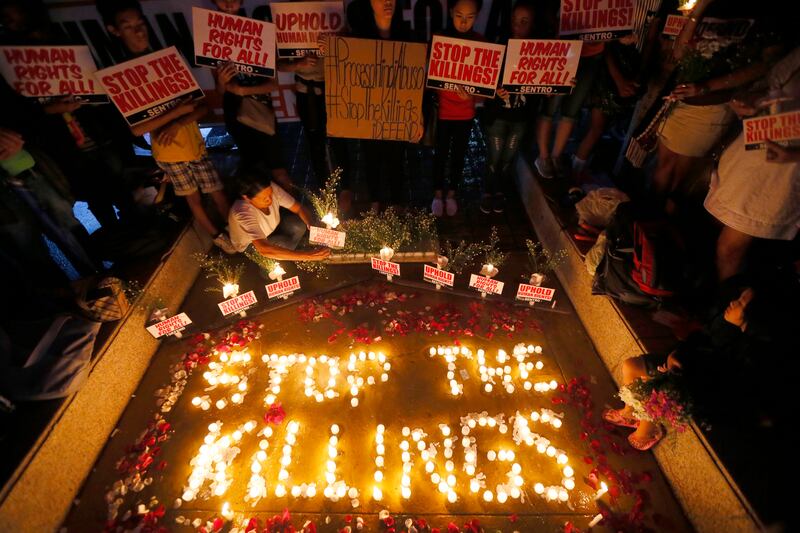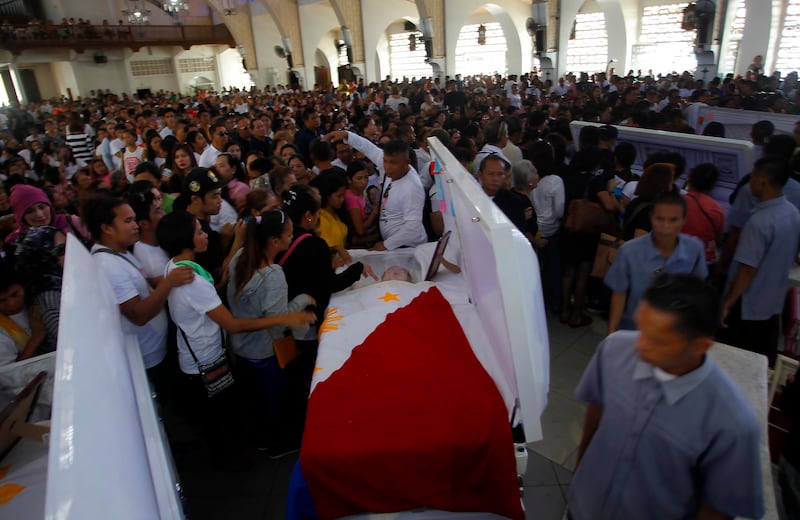A senior Philippine police officer who played a central role in ex-President Rodrigo Duterte's bloody drug war, during congressional testimony on Wednesday, accused the national police of corruption and said several high-ranking officers were protecting major drug cartels.
Lt. Col. Jovie Espenido alleged that both Ronald dela Rosa, his former boss as the national police chief and now a senator, and Duterte had ordered him to kill suspected drug figures as part of the administration's war on illegal drugs.
“From my experience, I can say that the PNP [Philippine National Police] is the biggest crime group in the country,” Espenido told a House of Representatives’ panel conducting a probe into the drug war.
The crackdown during the Duterte administration (2016-22) was notorious and heavily criticized by human rights groups because thousands of drug suspects were killed in officer-involved shootings.
Espenido, however, did not identify the police officials allegedly involved in protecting big-time drug lords.
He also alleged that Sen. Christopher “Bong” Go – a Duterte ally – had funneled money from various sources, including the government’s intelligence funds and Philippine offshore gaming operators, to reward police officers behind the killing of suspected drug lords.
Duterte’s camp, dela Rosa and Go quickly denied Espenido’s accusations.
It was not clear why Espenido, a 28-year veteran of the force, was turning on his superiors, but he said they had set him up to take the fall for police officials allegedly involved in drug operations.
‘That’s included, your honors’
Espenido, who described himself as a political outsider about to retire from active duty, also told lawmakers he had not been promoted due to suspicions that he had links to criminal activities.
Espenido claimed that in July 2016, Duterte and dela Rosa – then the head of the PNP – told him to “eliminate” known drug lords in his new assignment as police chief of Albuera town in the central Philippine province of Leyte.
Asked by lawmakers whether the word “eliminate” in police parlance meant killing suspects, Espenido said: “That’s included, your honors.”

President Duterte had accused Rolando Espinosa, then the town mayor, of being among local politicians involved in the drug trade.
The mayor surrendered to authorities in August 2016 but later died in prison three months later due to an alleged gunfight with police officers. The Philippine Senate and the National Bureau of Investigation later concluded that his death was a case of extrajudicial killing.
During Wednesday’s congressional hearing, Espinosa cast doubt on the police account of Espinosa’s death, noting that before the former mayor died, he had given a sworn statement that allegedly contained the names of senior police officers who had received payments from him.
Espenido also accused dela Rosa of involvement in the dismissal of cases against Espinosa’s son, a confessed drug lord, while other police officers were supposedly protecting the former mayor’s family.
A month after Espinosa’s death, the PNP reassigned Espenido to Ozamiz City in the southern province of Misamis Occidental.
In July 2017, city mayor Reynaldo Parojinog of southern Ozamiz city, and 14 other suspects – including his wife and brother – were killed in an operation led by Espenido.
Like Espinosa, Parojinog was also identified by Duterte as a politician allegedly involved in drug operations.
However, a month later, Espenido said he was summoned to the general police headquarters in Manila and accused of having links to a Malaysian drug network, although that case never prospered.
Espenido told lawmakers that the national police leadership had decided to send him to Ozamiz believing he would be killed by the Parojinogs.
Dela Rosa, Duterte’s camp, Go respond
Dela Rosa, the former Philippine police chief, denied having ordered Espenido to kill drug suspects, saying he had only instructed him to use “legal means to eradicate” the problem.
“I did not say he should kill people,” dela Rosa told reporters. “I did not order him to kill all drug addicts.”

Meanwhile, former Duterte presidential spokesperson Salvador Panelo told local news outlet GMA News that the ex-leader had not issued "kill" orders.
“Espenido is saying that the former president told him to clean the Albuera of drugs, which means to dismantle the drug syndicate,” Panelo said.
Go, for his part, accused Espenido of inventing lies against him. The senator told news outlet ABS-CBN News that he had never been involved in POGO operations or the war on drugs.
RELATED STORIES
[ Philippine Leader Says He Warned Mayors About DrugsOpens in new window ]
[ Philippines: Duterte Tells Police Official to Kill Drug SuspectsOpens in new window ]
[ Philippine Leader Meets Parents of Teen Slain in Drug RaidOpens in new window ]
[ Philippine Police: Mayor, 14 Others Killed in Drug RaidsOpens in new window ]
Drug war killings under Duterte
The national police have placed the number of suspected drug dealers and addicts killed during Duterte’s drug war to 8,000, although rights groups said it could be thrice as many.
Duterte is accused of mass murder at the International Criminal Court and a political feud with his once benefactor and successor President Ferdinand Marcos Jr. has placed his fate in a precarious situation, observers have said.
Carlos Conde, the Manila-based senior researcher for the Human Rights Watch in Asia, welcomed Espenido’s statements on Wednesday even as he said they needed to be followed through.
“It’s about time the biggest human catastrophe they unleashed is exposed,” he told BenarNews. “That the ones doing it are those who helped carry it out is particularly important, because, as veritable insiders, they won’t be so easily dismissed.”
